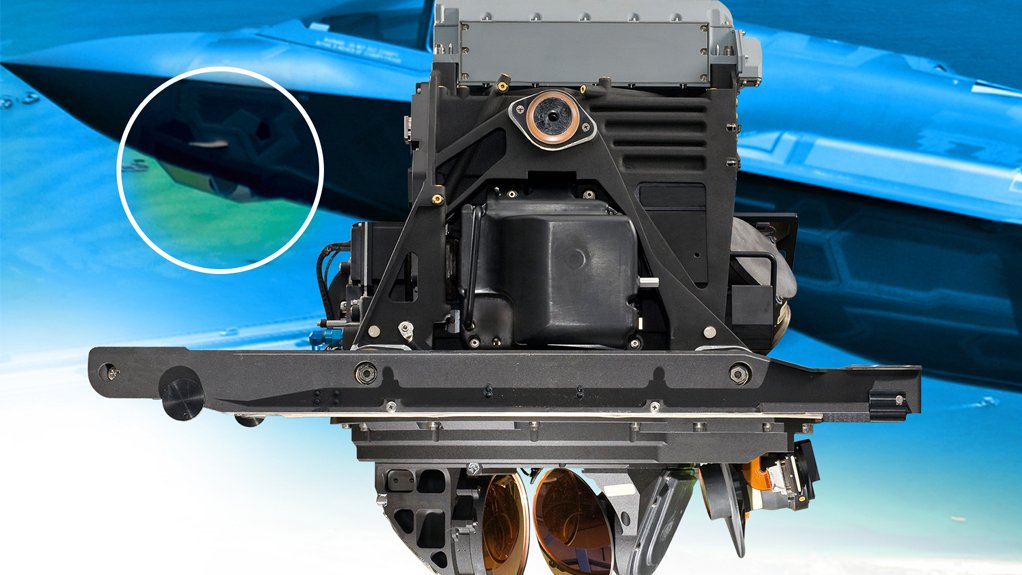Deliveries, not purchase orders place IBC Advanced Alloys ahead of pack


The Lockheed Martin F-35 Lightning II electro optical targeting system, for which IBC Advanced Alloys completed Beralcast azimuth gimbal housing components.
TORONTO (miningweekly.com) – Advanced alloys and precision castings company IBC Advanced Alloys is confident that its new disruptive beryllium-aluminium alloy casting process, known as Beralcast, would attract attention from diverse industries, where the striving for increased efficiency drove demand for super lightweight and strong materials.
The Vancouver-based manufacturer had last month successfully delivered its first completed Beralcast azimuth gimbal housing components to aerospace giant Lockheed Martin. The articles would be used in the Lockheed Martin F-35 Lightning II electro optical targeting system (EOTS).
“The deliveries are more important than purchase orders,” IBC CEO Anthony Dutton told Mining Weekly Online in a recent interview, pointing to several competitors that got purchase orders for the same product in the past, but failed to deliver on the timing, cost or integrity of the end products.
“We have made beryllium-aluminium casting commercially viable to a significant customer, proving that we can deliver at reduced costs, within budget and on time.
Lockheed Martin’s EOTS provided affordable, high-performance multifunction targeting to the F-35’s full spectrum of military operations. It was the first sensor to combine forward-looking infrared and infrared search and track functionality to provide F-35 pilots with situational awareness and air-to-air and air-to-surface targeting from a safe distance. The technology enabled aircrews to identify areas of interest, perform reconnaissance and precisely deliver laser- and global-positioning-system-guided weapons.
POTENTIAL TAKEOVER TARGET?
With the announcement on Monday that business magnate Warren Buffett’s Berkshire Hathaway had agreed to buy aerospace and energy industries equipment maker Precision Castparts in a deal valued at $37.2-billion, including debt, the spotlight was now on the cast parts sector.
IBC could also be seen as a potential takeover target for a downstream manufacturer such as Alcoa, which had been diversifying its portfolio through megadeals this year when it acquired specialty metal products suppliers RTI International Metals, Firth Rixson and TITAL.
Many future technologies required lighter, stiffer materials that had a very low coefficient of expansion, which related to how much a material expanded or contracted in different given situations, such as that found in the aerospace industry.
On July 29, 2011, US President Barack Obama announced an agreement with thirteen large automakers to increase fuel economy to 54.5 miles a gallon for American cars and light-duty trucks by model-year 2025. Dutton expected that the Corporate Average Fuel Economy regulations could very well benefit from his company’s technology.
He explained that every single one of the available technologies to reduce fuel consumption in vehicles, be it hybrid vehicles, electric vehicles, or any other form of modernisation, would be underpinned by lighter construction materials.
“Beralcast gives aerospace companies much greater design flexibility and improved options when designing advanced systems where weight and stiffness are critical performance factors. Beralcast makes beryllium-aluminium alloys with their superior materials performance accessible to automotive and other commercial markets where, previously, the cost of machined components was a barrier to entry,” Dutton advised.
UNIQUE PROCESS
Beralcast alloys were ideally suited to many aerospace applications where lightweight, high modulus and cost were critical performance factors. The alloy was found to be three times stiffer than aluminium, with 22% less weight and could be substituted for aluminium, magnesium, titanium, metal matrix composites as well as pure beryllium or powder metallurgy beryllium-aluminium.
The company currently had four plants in Indiana, Massachusetts, Pennsylvania and Missouri, in the US, with one dedicated to the emerging beryllium-aluminium castings business and the other three devoted to the beryllium-copper alloys business, which was responsible for about 85% of the company’s revenue.
In future, however, the proportions would increase in favour of the beryllium-aluminium castings, where Dutton expected a significant uptick in purchase orders from the aerospace industry.
He explained that what made the Beralcast process so unique was that whereas the traditional beryllium-aluminium alloy market was centred on machined components from alloy billets, IBC had invented a breakthrough method to cast the alloy for the first time, creating a disruptive technology that could change the market forever.
Dutton explained that the metals making up the alloy melted at different temperatures of about 650 °C and 1 100 °C, which, when left to cool down, would result in the one metal solidifying before the other and the metals essentially separating and destroying the alloy.
“The analogy we often use is salad dressing – if you shake it up the oil and vinegar remain distributed, but eventually, by the time you finish dinner, they are separated again, sitting one on top of the other. We’ve figured out a way to solve that problem,” Dutton stated.
After making the discovery, IBC had in 2010/11 first contacted Lockheed to introduce them to the new casting capability, which intrigued them, he said. The next three years were spent working extremely closely with Lockheed’s engineering team to develop the castings, before Lockheed last September placed a purchase order, which IBC delivered last month.
IBC did not have a patent on the casting method, as the process could be altered by only a small amount, leaving a patent invalid. Instead, the process had been documented in-house and was known to only a select few employees, which the company had been advised, would be the best way to keep its industry secret undiscovered.
“For small companies having a patent is potentially a double-edged sword, in that while you have a technical edge over competitors, you often then also have to engage in costly patent protection actions and we don’t feel it is necessary to waste time and effort on that,” Dutton commented.
Having abandoned the company’s rare-metals exploration arm in 2010, in favour of the more lucrative downstream business, IBC sourced its beryllium, which was unique in that there were only about three producers globally, mainly from Kazakhstan-based Kazatomprom, with which it had struck a stable five-year pricing agreement.
The company from time to time also sourced beryllium from competitors, as well as from the US strategic defence stockpile.
IBC’s TSX-V-listed stock had gained more than 8% in value since the start of the year and on Monday closed at C$0.12 a share.
Article Enquiry
Email Article
Save Article
Feedback
To advertise email advertising@creamermedia.co.za or click here
Press Office
Announcements
What's On
Subscribe to improve your user experience...
Option 1 (equivalent of R125 a month):
Receive a weekly copy of Creamer Media's Engineering News & Mining Weekly magazine
(print copy for those in South Africa and e-magazine for those outside of South Africa)
Receive daily email newsletters
Access to full search results
Access archive of magazine back copies
Access to Projects in Progress
Access to ONE Research Report of your choice in PDF format
Option 2 (equivalent of R375 a month):
All benefits from Option 1
PLUS
Access to Creamer Media's Research Channel Africa for ALL Research Reports, in PDF format, on various industrial and mining sectors
including Electricity; Water; Energy Transition; Hydrogen; Roads, Rail and Ports; Coal; Gold; Platinum; Battery Metals; etc.
Already a subscriber?
Forgotten your password?
Receive weekly copy of Creamer Media's Engineering News & Mining Weekly magazine (print copy for those in South Africa and e-magazine for those outside of South Africa)
➕
Recieve daily email newsletters
➕
Access to full search results
➕
Access archive of magazine back copies
➕
Access to Projects in Progress
➕
Access to ONE Research Report of your choice in PDF format
RESEARCH CHANNEL AFRICA
R4500 (equivalent of R375 a month)
SUBSCRIBEAll benefits from Option 1
➕
Access to Creamer Media's Research Channel Africa for ALL Research Reports on various industrial and mining sectors, in PDF format, including on:
Electricity
➕
Water
➕
Energy Transition
➕
Hydrogen
➕
Roads, Rail and Ports
➕
Coal
➕
Gold
➕
Platinum
➕
Battery Metals
➕
etc.
Receive all benefits from Option 1 or Option 2 delivered to numerous people at your company
➕
Multiple User names and Passwords for simultaneous log-ins
➕
Intranet integration access to all in your organisation


















